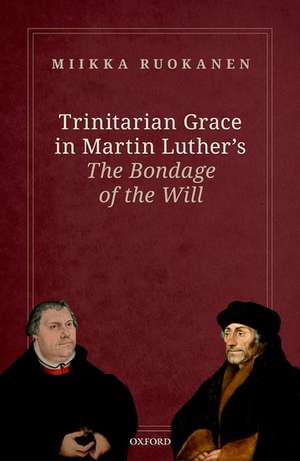Trinitarian Grace in Martin Luther's The Bondage of the Will
Autor Miikka Ruokanenen Limba Engleză Hardback – 27 mai 2021
Preț: 498.49 lei
Preț vechi: 612.38 lei
-19% Nou
Puncte Express: 748
Preț estimativ în valută:
95.40€ • 98.84$ • 79.62£
95.40€ • 98.84$ • 79.62£
Carte tipărită la comandă
Livrare economică 10-17 martie
Preluare comenzi: 021 569.72.76
Specificații
ISBN-13: 9780192895837
ISBN-10: 0192895834
Pagini: 238
Dimensiuni: 160 x 240 x 20 mm
Greutate: 0.49 kg
Ediția:1
Editura: OUP OXFORD
Colecția OUP Oxford
Locul publicării:Oxford, United Kingdom
ISBN-10: 0192895834
Pagini: 238
Dimensiuni: 160 x 240 x 20 mm
Greutate: 0.49 kg
Ediția:1
Editura: OUP OXFORD
Colecția OUP Oxford
Locul publicării:Oxford, United Kingdom
Recenzii
Professor Ruokanen is a thinker of global stature, deeply engaged with the theologies of Europe, North America, and China. Here his thorough scholarship and profound reflection on Martin Luther combine to offer a retrieval of Luther that is prophetically relevant to the twenty-first century. This is not only a convincing, original contribution to the understanding of Luther on key issues, including Jesus Christ, the Holy Spirit, the Trinity, Christian life, freedom, and grace; it is also an inspiring resource for churches of all traditions around the world-indeed, for anyone who shares in Luther's passionate attention to the Bible.
This book is well worth reading for anyone passionate about Luther or his theology.
Professor Miikka Ruokanen establishes a genuinely new understanding of Martin Luther's major theological treatise The Bondage of the Will. He offers a crucial modification and advance to the so-called Finnish school of Luther interpretation. Ruokanen's work reveals the Trinitarian and, more specifically, the powerfully Pneumatological and participatory nature of grace in Luther's argument against Erasmus.
Ruokanen opens up new perspectives on the depth and function of Luther's understanding of the Trinity and the relationship of God with his people in this provocative study. It invites rich scholarly exchange on the nature of the union of Christ with believers and other aspects of the De servo arbitrio in relationship to Luther's larger oeuvre.
Differing from previous research, which mainly focuses on specialized problems, Ruokanen succeeds in creating an excellent comprehensive analysis of Luther's magnum opus, The Bondage of the Will. He establishes the Trinitarian nature of Luther's theology and displays the central role of the Holy Spirit in his theocentric doctrine of grace.
In this book of Miikka Ruokanen we have a wise and faithful guide to exploring Luther's doctrine of grace, alongside all of its ecumenical horizons. Anyone seeking to understand this central theme of the Reformation and its relevance to the world church today must read this book.
The richness of Ruokanen's work and the persuasiveness of his exposition can hardly be done justice in the space of this review. Suffice it to mention implications beyond the field of Luther research that are important for contemporary systematic theology... In an epoch in which theological sentimentalism blindly accommodating structures of malice and injustice prevails, Ruokanen's pathbreaking exposition of a classic text of Reformation theology merits wide reading and discussion.
It is a must-read for all those engaged in Luther research and the field of Reformation soteriology more generally.
This book is well worth reading for anyone passionate about Luther or his theology.
Professor Miikka Ruokanen establishes a genuinely new understanding of Martin Luther's major theological treatise The Bondage of the Will. He offers a crucial modification and advance to the so-called Finnish school of Luther interpretation. Ruokanen's work reveals the Trinitarian and, more specifically, the powerfully Pneumatological and participatory nature of grace in Luther's argument against Erasmus.
Ruokanen opens up new perspectives on the depth and function of Luther's understanding of the Trinity and the relationship of God with his people in this provocative study. It invites rich scholarly exchange on the nature of the union of Christ with believers and other aspects of the De servo arbitrio in relationship to Luther's larger oeuvre.
Differing from previous research, which mainly focuses on specialized problems, Ruokanen succeeds in creating an excellent comprehensive analysis of Luther's magnum opus, The Bondage of the Will. He establishes the Trinitarian nature of Luther's theology and displays the central role of the Holy Spirit in his theocentric doctrine of grace.
In this book of Miikka Ruokanen we have a wise and faithful guide to exploring Luther's doctrine of grace, alongside all of its ecumenical horizons. Anyone seeking to understand this central theme of the Reformation and its relevance to the world church today must read this book.
The richness of Ruokanen's work and the persuasiveness of his exposition can hardly be done justice in the space of this review. Suffice it to mention implications beyond the field of Luther research that are important for contemporary systematic theology... In an epoch in which theological sentimentalism blindly accommodating structures of malice and injustice prevails, Ruokanen's pathbreaking exposition of a classic text of Reformation theology merits wide reading and discussion.
It is a must-read for all those engaged in Luther research and the field of Reformation soteriology more generally.
Notă biografică
Miikka Ruokanen is Professor Emeritus of Dogmatics at the University of Helsinki, Finland, and Professor of Systematic Theology at Nanjing Union Theological Seminary, China. He is also Guest Professor at the Renmin University of China, Beijing, and Advisory Professor at Fudan University, Shanghai. His publications include include The Catholic Doctrine of Non-Christian Religions: According to the Second Vatican Council (Brill, 1992), Theology of Social Life in Augustine's De civitate Dei (Vandenhoeck & Ruprecht, 1993), and Christianity and Chinese Culture (co-edited with Paulos Huang; Eerdmans, 2010).
